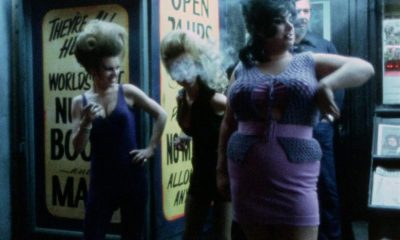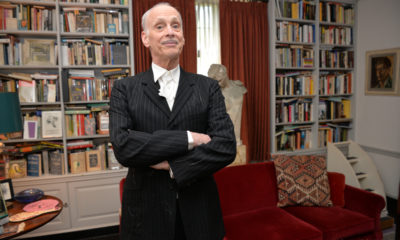Theater
America’s Bard
Legendary gay playwright Tennessee Williams honored in centennial festival
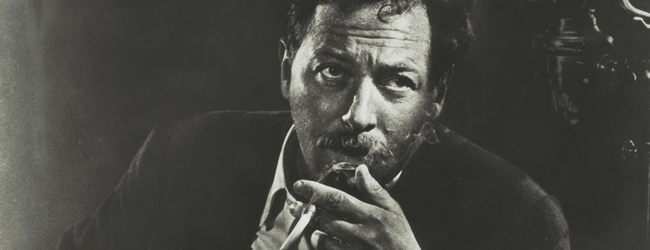
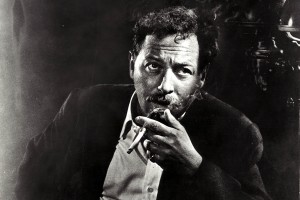
Tennessee Williams' homosexuality widely informed his work, often in coded ways. (Photo courtesy of the Tennessee Williams Papers, Rare Book and Manuscript Library, Columbia University)
He is the poet laureate of the American theater.
He pursued young men and boys with sexual voracity, especially hustlers, often rough trade, and those obsessively so in his latter years, but he also delighted greatly in the company of women.
His greatest creations on stage were in fact women, though some argue they were really coded figures who were actually gay males in drag. Certainly most of his heroines — especially perhaps Blanche DuBois in “A Streetcar named Desire” — were extensions of himself, valorous but doomed, haunted by desire, shadowed by failure, driven to despair and sometimes even to madness or to death.
He is Thomas Lanier Williams, born 100 years ago this weekend on Palm Sunday, March 26, 1911, in Columbus, Miss., to Edwina and Cornelius Williams. He was reared in an Episcopal rectory there, where his grandfather, Rev. Walter Dakin, was the local Episcopal priest, and later changed his name to “Tennessee” in honor of that same grandfather, who was born in that state.
Williams’ sense of sin and salvation in sexuality was central to his inner drives, says Derek Goldman, artistic director of this weekend’s Tennessee Williams Centennial Festival, a raft of plays and staged readings and panel discussions featuring appearances by among others Edward Albee and John Waters (Visit performingarts.georgetown.edu/tenncentfest/festival/ for details). For a long time, Williams was closeted about being gay, though he let it be known to his friends. Goldman says that though Williams had a long-time love relationship with his life partner Frankie Merlo, he was also “very promiscuous, and slept around a lot,” when “his need was for several boys a day at times, and the younger and prettier the better.”
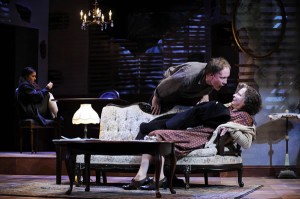
Georgetown University's production of 'Glass Menagerie,' one of Tennessee Williams' most famous works. From left are recent alumni Rachel Caywood and Clark Young with Prof. Sarah Marshall. (Photo by Sue Kessler, courtesy of Georgetown University)
In his writing, however, Goldman says, the thirst to slake his need for for constant sexual consummation, took a different form through sublimation, because in his writing, he “explores not so much the sex but how those desires have a place in society” — or do not. Goldman is also associate professor of theater and performance studies at Georgetown University, where the Williams Festival — known for short as “Tenn Cent Fest” — is housed, and he directs the university’s Davis Performing Arts Center. Goldman says the festival, most of which runs from today through Sunday, has “certainly been a labor of love,” including being able to teach a seminar on Williams work and “for this past year” he says he has been “steeped in all things Williams.”
Goldman’s own first encounter with Williams came on cable TV, however, when he was about 13 and saw the film adaptations of “Streetcar Named Desire” (1951,) and “Cat on a Hot Tin Roof” (1958). In each case, of course, Hollywood producers insisted in excisions, and Goldman admits that “I now blush at the fact that they were so sanitized, taking much of the sexuality out.”
For example, Goldman points out that in the original version of “Cat” (which was on Broadway in 1955 when it was directed by Elia Kazan and won the Pulitzer Prize for Drama), it’s clear that Brick (first played by the actor Ben Gazzara) is actually bisexual, or even gay, as he admits to his feelings for his pro football buddy Skipper who has committed suicide. Goldman says that “the back story for Brick is his relationship with Skipper,” and that while Brick’s “sexuality is pretty complicated,” he has certainly “lost interest in Maggie sexually,” and “we understand that he definitely has homosexual desires.”
We, of course, mainly know Williams from his work. That is the only reason he rates such a “Tenn Cent Fest” weekend, more than a quarter century after his death, as Goldman is now curating. But behind and beneath that work was always his beating heart. Reading his private writing shows him “so emotionally naked, as he was working out his own stuff,” Goldman says.
“It shows the undulation between guilt and shame (at being gay), not being accepted for who he really was, and also being able to claim it with pride,” Goldman says. “It was not just one thing. It was a stew of contradictions pulsing back and forth in private.”
In one of Williams’ one-act plays, “Suddenly, Last Summer,” that opened off-Broadway in 1958 as part of a double-bill titled “In The Garden District,” the play is basically two long monologues, considered one of his starkest and most poetic works. Best known from the 1959 film adaptation, it is a mystery melodrama about why Catherine (Elizabeth Taylor in the film) has been institutionalized for severe emotional disturbance, the result of the violent death of her cousin Sebastian by dismemberment and cannibalism by local boys, the objects of his predatory sexual desire, she had witnessed during their trip to Spain. Sebastian’s wealthy mother, Violet Venable (Katharine Hepburn) is determined to hide the exact circumstances of her son’s death and the fact that he was gay.
Maya Roth, Georgetown’s director of theater and performance studies, is directing “Suddenly, Last Summer” at the Davis Performing Arts Center April 7-16. “It is a play about violence against homosexual men,” she says. “It’s about Sebastian,” who is never seen, except at a distance in memory, “and his queerness that can’t be mentioned, the love that dare not speak its name, that’s what ‘Suddenly, Last Summer’ is about.” Though sanitized in the film version, it was written as one of his early plays but for a long time remained unproduced. When it was finally presented on stage, it was a kind of “coming out” for Williams, she says, “and it was really radical, and the reason why Hollywood had to airbrush it out.”
Asked about the legacy of Williams — his many plays as well as novels and short stories and occasional screenplays — Goldman says, “it’s more than a legacy, it’s the urgency still in his work, because it’s still very fresh,” in what he calls its “incredible lyricism and heat, the poetry of its fierce and ferocious imagery, in its language as windows into the soul.”
“He’s the poet of the vulnerable, whose compassion is in the size of his tenderness and faith in the beauty of the broken, those who have suffered the collateral damages of a world that doesn’t celebrate individuality, that doesn’t make allowances for the beauty of the broken,” Goldman says. “He’s the one who pierces the heart and the intellect, but it’s the heart, the emotional connection that we have to his work, that is most indelible.”
“He’s our American Shakespeare,” Goldman says, “combining the elevation of lyricism and magician-ship of language with the power of great story-telling,” and for Goldman, of all of Williams’ work there stands what he calls “the holy trinity,” his own “personal pantheon” of Williams’ three greatest creations: “The Glass Menagerie” (1944), “Streetcar Named Desire” (1948) and “Camino Real” (1953). The latter is being performed in a staged reading directed by Goldman tonight at 7:45 p.m.

‘Uncle Vanya’
Through April 20
Shakespeare Theatre Company
Harman Hall
610 F St., N.W.
Shakespearetheatre.org
Shakespeare Theatre Company’s “Uncle Vanya” freshly rendered by director Simon Godwin and starring Hugh Bonneville in the title role, puts a pleasing twist on Chekhov’s tragicomic classic.
As disheveled, disheartened, and overworked Vanya, Bonneville is terrific. Though very different from the actor’s fame making role as Downton Abbey’s Lord Grantham, a proud, fastidiously turned-out aristocrat who presides over a manicured country estate peopled by a large staff, his Vanya is equally compelling
For “Uncle Vanya,” Chekhov imagines a house on a ragged estate in the Russian forest whose inhabitants display varying degrees of discontent brought on by the realization that they’re leading wasted lives. Middle-aged Vanya’s dissatisfaction and disappointment have been tempered by years of hard work. But all of that is about to be challenged.
With his plain and steadfast niece Sonya (Melanie Field), Vanya keeps the place going. And while barely putting aside a kopek for himself, he’s ensured that proceeds have gone to Sonya’s father Alexandre, a querulous academic (Tom Nelis), and his alluring, much younger second wife Yelena (Ito Aghayere) who live in the city.
When called to retire, the self-important professor and his wife economize by joining the family in the country. Overcome by the intense boredom brought on by provincial isolation, they’re not happy. Turns out, life in the sticks isn’t for them.
At the same time, the urban couple’s presence generates quite an effect on the rural household, changing the mood from one of regular work to idleness. What’s more, Vanya and family friend Mikhaíl Ástrov (John Benjamin Hickey), an unusually eco-aware, country doctor, are both bewitched by Yelena.
Meanwhile, young Sonya, who’s long carried an unrequited torch for Ástrov grows increasingly smitten. And while Yelena, who’s bored with her aging husband, expresses teasing tenderness with Vanya, she feels something more serious for Ástrov. It’s a whole lot for one house.
Superbly staged by Simon Godwin, STC’s artistic director, and performed by a topnotch cast, the very human production begins on an unfinished stage cluttered with costume racks and assorted props, all assembled by crew in black and actors in street clothes. We first see them arranging pillows and rugs for an outside scene. Throughout the play, the actors continue to assist with set changes accompanied by an underscore of melancholic cello strings.
With each subsequent scene, the work moves deeper into Chekhov’s late 19th century Russian world from the kitchen to the drawing room thanks in part to scenic designer Robert Brill’s subtle sets and Susan Hilferty and Heather C. Freedman’s period costumes as well as Jen Schriever’s emotive lighting design.
In moments of stillness, the set with its painterly muted tones and spare furnishings is a domestic interior from a moment in time. It’s really something.
Adapted by contemporary Irish playwright Conor McPherson, the work is infused with mordant wit, ribald comedy, and sadness. Like McPherson’s 2006 play “The Seafarer” in which the action unfolds among family, friends and others in a modest house filled with confrontation, laughter, resentment, and sadness. All on brand.
For much of “Uncle Vanya,” McPherson’s script leans into humor, funny slights, the professor’s pretentions, and Vanya’s delicious snarky asides; but after the interval, the play’s stakes become perilously heightened ready to explode with resentment and feelings of wasted potential, particularly frustrations expressed by Vanya and his intelligent but unfulfilled mother (Sharon Lockwood).
When it appears that mismatched couple Alexandre and Yelena are poised to depart, the house is struck with a sense of both relief and gloom.
Not everyone is disturbed. In fact, the family’s old nanny Nana (Nancy Robinette), and Waffles (Craig Wallace), a former landowner and now lodger on the estate, are elated. Both are eager to return to the pre-professor schedule of an early breakfast and midday lunch, and menus featuring simpler fare. They long for the return of the humble Russian noodle.
“Uncle Vanya”melds cynicism and hope. Like life, it’s a grasp at fulfillment.
Theater
Out actor Ángel Lozado on his new role in ‘In the Heights’
Lin-Manuel Miranda’s musical at Signature Theatre through May 4

‘In the Heights’
Through May 4
Signature Theatre
4200 Campbell Ave., Arlington, VA
Tickets start at $40
Sigtheatre.org
Before his smash hit “Hamilton” transformed Broadway, Lin-Manuel Miranda wrote “In the Heights,” a seminal musical set in an upper Manhattan barrio. Infused with hip-hop, rap, and pop ballads, the romance/dramedy unfolds over a lively few days in the well-known Latin neighborhood, Washington Heights.
Now playing at Signature Theatre in Arlington, “In the Heights” features handsome out actor Ángel Lozado as the show’s protagonist Usnavi de la Vega (named for a U.S. Navy vessel), a young Dominican American bodega owner who figures warmly in the center of the hood and the action.
A durable part that Lozado has wanted to play for some time, it’s proved the perfect vehicle to showcase his talents in a story that rings true to his heart.
WASHINGTON BLADE: Timing is very important to you.
ÁNGEL LOZADO: During rehearsal at Signature, our director James Vásquez said “In the Heights” finds you at a time when you need it. And that definitely resonates with me.
In the past I was up for Usnavi several times and then I was standby in the part for two weeks at the Muny in St. Louis but never called to go on.
And then, I lost my grandmother in January and was cast at Signature. In the show, the neighborhood loses their abuela [played by Rayanne Gonzales], I feel like I was meant to play the part at this moment. I’m a firm believer in the timing of it all.
BLADE: You’ve trained vocally at Florida State University, debuted on Broadway in “Bad Cinderella,” sang in “Jesus Christ Superstar Live (NBC),” and sung in many other musicals, but I’m guessing this is different?
LOZADO: Rapping is the most challenging part of the role. I’m trained in musical theater. I can sustain eight shows a week, but this is different. Rapping is more taxing. It’s challenging. With rap it’s clipped and the throat gets tighter.
BLADE: Like so much of Manhattan,Washington Heightshas changed a lot since 2008 when the show is set.
LOZADO: I currently live in Washington Heights and it’s very gentrified. Rents are high. I don’t think it was their intention to do a period piece but “In the Heights” is a period piece.
BLADE: And you grew up in Orlando, Fla., where before discovering theater, you were heavily into baseball.
LOZADO: I’m Puerto Rican, and baseball is a big part of our culture. My parents put me on a team at five, and I played first base through mid-high school. That was going to be a career. Went from one crazy career to another. When I got to high school, I was struggling with my queerness being in the sports world — struggled with my identity and the space I was in, I lost my love for baseball.
BLADE: How did you find your way to theater?
LOZADO: Through high school choir. It was a hard switch, but one that I couldn’t resist.
BLADE: You’ve been openly queer in the business. Has that ever been a problem?
LOZADO: I don’t know if it’s problematic or not. As actors, we don’t get behind the closed doors of casting. I do know that I’ve gotten to play lots of roles regionally that are straight men and that hasn’t been a problem.
Then again, I’ve cosplayed as a straight man most of my life. It makes me laugh when people see me offstage, they’re like, “Wow, you were really convincing as straight on stage.” I’ll take that compliment because that means I’m acting.
BLADE: Tell me about other roles you’ve played
LOZADO: Latin roles: Usnavi, Bernardo in “West Side Story,” Emilio Estefan in “On Your Feet!” and Che in “Evita.”And while I was thrilled to play those great parts, at the same time, I had friends getting auditions that weren’t specific to them being white, Black, or whatever. I worked with people who are more seasoned in the industry who had done 12 productions of “Evita.” I didn’t want to do that. I love representing my culture but I’d also like to do parts that have nothing to do with that. Dream roles include Sondheim’s “Sunday in the Park with George.”
BLADE: And how about a new work? Would you like creating a role on Broadway?
LOZADO: Oh yes, that’s the big dream.
BLADE: Do you think “In the Heights” might appeal to both Latin and queer audiences?
LOSADO: Yes.To see a people show themselves in a way that’s different from the stereotypes, telling our story in our own way, and not allowing the headlines define who we are, but to stand up in our joy.
“In the Heights” holds up the Latin community and, for me, that’s a parallel to the queer community, celebrating itself, especially in the upcoming time of WorldPride DC 2025 events (May 23-June 8).
Theater
Celebrated local talent Regina Aquino is back on the boards
Queer actor starring in Arena Stage’s ‘The Age of Innocence’

‘The Age of Innocence’
Through March 30
Arena Stage
1101 Sixth St., S.W.
Tickets start at $59
Arenastage.org
Actor, director, and now filmmaker, celebrated local talent Regina Aquino is back on the boards in Arena Stage’s “The Age of Innocence,” staged by the company’s artistic director Hana S. Sharif.
Adapted by Karen Zacarías from Edith Wharton’s 1920 masterpiece novel, the work surrounds a love triangle involving New York scion Newland Archer, his young fiancée, and the unconventional beauty Countess Olenska. The Gilded Age-set piece sets up a struggle between rigid societal norms and following one’s own heart.
Aquino — a queer-identified first-generation Filipino immigrant who grew up in the DMV— is the first Filipino American actress to receive a Helen Hayes Award (2019). She won for her work in Theater Alliance’s “The Events.”
In “The Age of Innocence,” Aquino plays Newland’s mother Adeline Archer, a widow who lives with her unmarried, socially awkward daughter Janey. No longer a face on the dinner party circuit, she does enjoy gossiping at home, especially with her close friend Mr. Sillerton Jackson, a “confirmed bachelor” and social arbiter. Together, they sip drinks and talk about what’s happening among their elite Manhattan set.
WASHINGTON BLADE: Do you like Mrs. Archer?
REGINA AQUINO: There’s a lot of joy in playing this character. She’s very exuberant in those moments with her bestie Sillerton. Otherwise, there’s not much for her to do. In Wharton’s book, it says that Mrs. Archer’s preferred pastime is growing ferns.
BLADE: But she can be rather ruthless?
AQUINO: When it comes to her family, yes. She’s protective, which I understand. When she feels that her family’s under attack in any way, or the structure of the society that upholds way of life is threatened, she leans hard into that.
The rare times that she’s out in society you see the boundaries come up, and the performative aspect of what society means. She can be very mean if she wants to be.
BLADE: Can you relate?
AQUINO: I come from a large Filipino matriarchal family. Mrs. Archer is someone I recognize. When I’m in the Philippines, I’m around people like that. People who will do business with you but won’t let you into their inner circle.
BLADE: Did you ever imagine yourself playing a woman like Mrs. Archer?
AQUINO: No. However, in the past couple of years diversely cast TV shows like “Bridgerton” and “Queen Charlotte” have filled a need for me that I didn’t I know I had.
With stories like “The Age of Innocence” that are so specific about American history, they aren’t always easily imagined by American audiences when performed by a diverse cast.
But when Karen [Zacarías] wrote the play, she imagined it as a diverse cast. What they’re presenting is reflective of all the different people that make up America.
BLADE: You seem a part of many groups. How does that work?
AQUINO: For me, the code switching is real. Whether I’m with my queer family, Filipinos, or artists of color. It’s different. The way we talk about the world, it shifts. I speak Tiglao in the Philippines or here I may fall into an accent depending on who I’m with.
BLADE: And tell me about costume designer Fabio Tablini’s wonderful clothes.
AQUINO: Aren’t they gorgeous? At the Arena costume shop, they build things to fit to your body. It’s not often we get to wear these couture things. As actors we’re in the costumes for three hours a night but these women, who the characters are based on, wore these corseted gowns all day, every day. It’s amazing how much these clothes help in building your character. I’ve found new ways of expressing myself when my waist is cinched down to 26 inches.
BLADE: Arena’s Fichandler Stage is theatre-in-the-round. Great for costumes. How about you?
AQUINO: This is my favorite kind of acting. In the round there’s nowhere to hide. Your whole body is acting. There’s somebody somewhere who can see every part of you. Very much how we move in real life. I find it easier.
BLADE: While the Gilded Age was opulent for some, it wasn’t a particularly easy time for working people.
AQUINO: The play includes commentary on class. Never mind money. If you’re not authentic to who you are and connecting with the people you love, you’re not going to be happy. The idea of Newland doing what he wants, and Countess Olenska’s journey toward freedom is very threatening to my character, Mrs. Archer. Today, these same oppressive structures are doing everything here to shutdown feelings of liberation. That’s where the heart of this story lands for me.
-

 District of Columbia4 days ago
District of Columbia4 days agoFinal push to raise funds, fill D.C. hotels as WorldPride nears
-

 District of Columbia3 days ago
District of Columbia3 days agoReenactment of 1965 gay rights protest at White House set for April 17
-

 Maryland4 days ago
Maryland4 days agoFreeState Justice: Transgender activist ‘hijacked’ Moore’s Transgender Day of Visibility event
-

 Hungary4 days ago
Hungary4 days agoHungarian MPs amend constitution to ban public LGBTQ events



